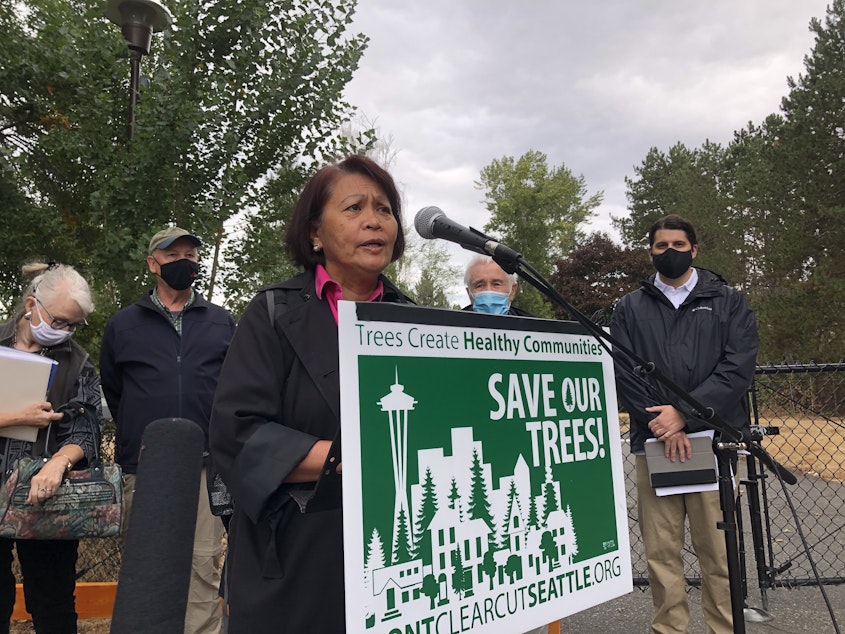Seattle voters back stronger tree protections in recent poll

Supporters of stronger tree protection regulations in Seattle say most voters are on their side, according to newly released poll results. They’re hoping the findings help spur a long-awaited city ordinance.
In July, the Northwest Progressive Institute surveyed 617 likely Seattle voters about issues in the primary election. They also asked voters about tree canopy.
Of the people surveyed, 81% said they support stronger rules requiring developers to keep more existing trees, and 82% want increased tree planting in low-income neighborhoods.
Institute Director Andrew Villeneuve said these questions got the most favorable response of any issue in the survey.
“Those are really robust findings – anytime you have a poll finding up in the 80s in total, which we do in this case, it really shows that voters have reached an accord in terms of where they are on the issue.”
A slightly smaller majority supported specific proposals like adding tree replacement requirements, and creating a city tree planting and preservation fund. Creation of a permitting process for removal of significant trees had the narrowest support, at 57%.
Maria Batayola chairs the Beacon Hill Council. She says residents in her neighborhood support stronger tree legislation.
“We are surrounded by air and noise pollution” from I-5 and airplanes, “and now we’re experiencing the climate impacts of heat,” she said.
Sponsored
Batayola said in 2017 nonprofit organization El Centro de la Raza held 24 community meetings, and one priority in the community action plan they created was to plant more trees.
“Trees are a big part of our health resiliency,” she said. “I think this poll really shows that enough people really support it, and it’s time for action.”
She called on Seattle Mayor Jenny Durkan and City Council to move forward with stronger legislation, which advocates have been seeking for the past 12 years. In a statement, Seattle City Councilmember Alex Pedersen also urged Mayor Durkan to propose legislation.
“I agree with the environmentalists who spoke out today that City Hall (they) should not need such strong polling results to do the right thing and save Seattle’s trees,” Pedersen said. “The Durkan Administration should immediately deliver the tree protection ordinance that was required over a year ago by City Council Resolution.”
Pedersen added, "In the meantime, we should consider short-term solutions such as a moratorium to prevent removal of large, exceptional trees and long-term solutions such as consolidating all tree regulations under the Office of Sustainability and Environment instead of with the department that caters to real estate developers (SDCI). In the next couple of weeks, I plan to work with colleagues to produce an ordinance requiring registration of tree cutters to increase transparency, accountability, and the proven environmental justice benefits of a flourishing urban forest.”
A spokesperson for Mayor Durkan was not able to immediately respond to Pedersen's statement. At a City Council meeting in 2019, SDCI staff said they were improving enforcement of existing city codes, even in the absence of a new ordinance.
Sponsored
Developers have said new regulations could add costs and delays to building much-needed housing.
Tree activists including representatives from Seattle Audubon and Plant Amnesty held their event at the proposed Talaris housing development, at the site of a former research institute in Laurelhurst. They want the city and developers to redesign the project which is intended to create dozens of luxury homes, in order to spare hundreds of trees slated for removal including 175 “exceptional” trees, based on size or presence of tree groves.
Woody Wheeler, a volunteer with Seattle Audubon, said the property is home to a large eagle’s nest and extends the bird habitat available in the Union Bay Natural Area nearby.
In a statement, Seattle Audubon said “Seattle can densify, prevent sprawl, protect more trees, and plant more new ones.” The group pointed to Washington D.C. which it said “continues to increase both population density and tree canopy cover through strong tree protections, dedicated funding, and coordinated urban forestry management.”
A 2016 assessment found Seattle had 28% canopy cover, short of its 30% goal, and was continuing to lose big trees.
Sponsored
Steve Zemke, the founder of the group TreePAC and a former member of the city’s Urban Forestry Commission, said Portland, Oregon also has stronger tree protections than Seattle, and requires developers to pay into a tree replacement fund.
“They have now over $4 million in their fund as of their latest budget, that’s there to help plant trees across the city. Seattle isn’t doing that, and that’s where they’re not being innovative, they’re not looking forward and doing what we can to both protect existing trees and plant trees where they’re needed.”




